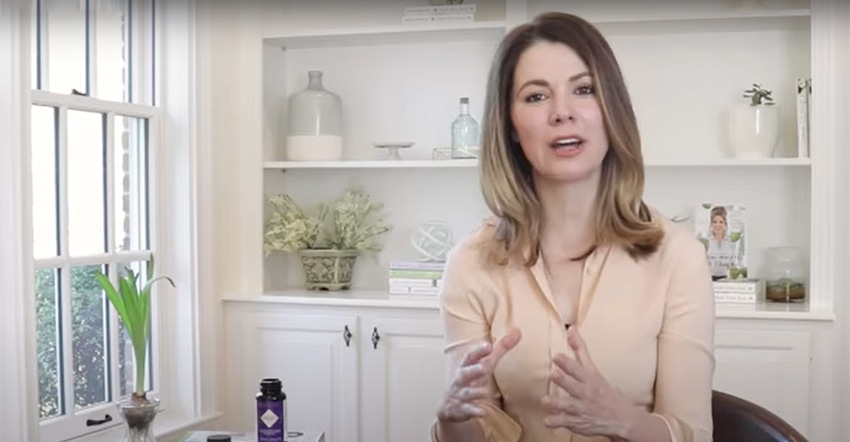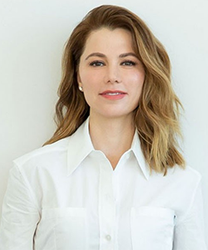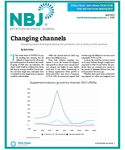April 24, 2023

The reality of omnichannel marketing for the supplement industry is that while every brand attempts to sell in every channel, very few effectively market across all of them. Naomi Whittel wants to change that.
Whittel, who launched Reserveage and later served as CEO at Twinlab before leaving the industry to write books on beauty and wellness, is back with a new brand, OMI, and on a mission to master all the mediums, particularly TV via QVC. Whittel believes the supplements industry has barely scratched the surface in connecting with consumers across platforms like QVC and Instagram.
NBJ talked to her about the potential for the new mediums to build trust in supplements.
What led you to QVC?
Whittel: I was approached by people that worked with QVC in 2011, because they were very interested in my resveratrol with Reserveage. My first meeting was actually all about supply chain, and all about how I was sourcing ingredients and the testing of my ingredients because some of their partners' products had just been tested by consumer labs and not passed. So, the conversation was about quality and efficacy and science. I was working with the University of Florida on clinical research that was being done on my resveratrol, and we immediately bonded.
 What were the next steps?
What were the next steps?

Whittel: We had that meeting and by the end of 2011 I was on air. We had started with a wonderful representative of our brand, a wonderful nutritionist. It's live television and it's really about how you communicate the legal language. They asked if I would, as a founder, go on air because the innate passion of a founder is very important in the communication. So, I started going on air at the end of 2011 and I stayed on air all the way until I sold Reserveage and during my time as CEO of Twinlab, right up until my first book came out in March of 2018 and became a New York Times bestseller and I basically stopped being a CEO and I left QVC.
What brought you back?
Whittel: What brought me back was I really love QVC so much. They called me and it was in the middle of the pandemic. They said 'You know, we really care about the wellbeing of our customers and we wonder if you could bring us products. We know your quality. We know your efficacy. We know your commitment to science, and we'd like you to bring the most innovative products that are really geared toward a woman. Is there a way for you to bring a vitamin D that is formulated for a woman? They posed that question almost two years ago.
Did you have a brand at the time?
Whittel: I was just coming out of my non-compete. I knew that I wanted to be a direct-to-consumer brand and I was just starting to explore what my brand would look like. I had a skincare brand at the time, my skincare brand is called OMI, which stands for Outside Meets Inside. It's the only skincare brand that activates autophagy, a natural process that really brings youth into our cells. It's what I wrote my book Glow 15 on. The 2016 Nobel Prize in in medicine was around the research of autophagy. So, I had my own brand and I said, "Okay, I'm going to bring OMI to QVC," and that's how it started. We just launched on Jan. 17.
What can the supplement industry learn from a platform like QVC?
Whittel: I think what the supplement industry can learn from QVC about the customer is that having someone buy a nutritional supplement from your brand is a huge commitment. It's all about trust, because you're asking that person to put this product in their mouth and into their bodies. There's so much noise and a lot of it's understandable around our industry. So, what I think supplement companies can learn from QVC is that it's all about really communicating, effectively, the trust. The best way I know how to do that is sharing your supply chain. I only can trust it if I can touch it and feel it.
I have this ingredient called spice fruit that I brought back from Cameroon and I had to go there to see where it comes from. It's why I was in New Zealand sourcing the hair peptides that I that I brought to QVC. I always go to the source. I go to the farmers and I go to the universities, to the scientists. We co-create these products and I think that co-creation is hugely beneficial for the consumer when they understand that co-creation. I see it every day in the relationship that we have with the QVC shopper. She really wants to know and needs to know all of that in order to have trust, and it's all about trust with any brand.
What would it do for the industry if every CEO or every founder had to stand on camera and talk about their supplements? Would that change them?
Whittel: For me, that conversation is so much based on heart and soul and commitment to this entire supply chain. I am literally obsessed with our ingredients and through that obsession I can bring the consumer really special ingredients. Why am I doing it? Because I'm sourcing ingredients and I know I'm bringing it back to the QVC shopper. So I think for any founder and CEO to have the privilege of being able to be deeply connected with their products, I think it would be a big part of how you build the soul of the brand, how you build products that you're really pleased to be connected with and partnered with. That's what QVC does. I think it's valuable for any CEO, any founder, when they build their brand to be able to communicate it in any different platform. If you can keep that level of potency in the conversation across various platforms, it's fantastic.
What's different about the relationship QVC and other live video platforms help you develop with consumers?
Whittel: In one hour from now, I go live on Instagram and Facebook, for what we call Well Beauty Wednesday and I have a conversation with the QVC shopper where they ask questions. Just because I'm on air sharing the products with them, that's not where our relationship stops. It's ongoing. It's a deep relationship and it's the same thing with direct to consumer. It's about bringing that into retailers as well. We're doing that more and more with Sprouts Farmers Market. You have to communicate different but you can look at retailers like Sephora and they'll have images of the founders and their philosophy right up on the shelf.
Do you think the industry is making the most of those kinds of connections?
Whittel: I think we're just starting to scratch the surface and I think the more we follow our passion, individually, the deeper we can go. It's a very passionate industry. The CEOs are very passionate. I'm in the well beauty category and I think beauty is way ahead of us. They get it and there's a lot of authenticity with founders there. I'd like to see more of that in our nutritional space.
How have companies extensions into direct-to-consumer changed the relationship with retailers?
Whittel: DTC brands have always been able to drive consumers into retail. That's just part of part of the direct-to-consumer relationship, you know. The consumer doesn't necessarily always want to purchase from the DTC platform or from the Amazon platform. If they're grocery shopping and they see their brand, and it's more convenient, they're going to pick it up. So, there's some really nice synergies.
I launched Reserveage in 2009, and then sold and at the end of 2015 and it's a completely different relationship now. The conversations that I'm having with Sprouts are more around how do I drive my customer to your shelf so that the customer has the most convenient experience and the easiest options? We all have so many options for buying now. I mean, we can buy on Instagram. It's just such a different world.
A lot of new consumers came into the market during the pandemic. What does the industry need to do to hold on to them?
Whittel: We need to continue to strengthen our supply chain. There's so much negative messaging. There's so much misinformation. The consumer is super overwhelmed and confused. That's not a new message. We've been hearing that forever. So it's really about strengthening supply to where the consumer can feel confident and understand what it is that they're getting and what it is that they're putting into their body. What they're sharing with their children, with their parents. That's the work that we need to keep focusing on.

About the Author(s)
You May Also Like



